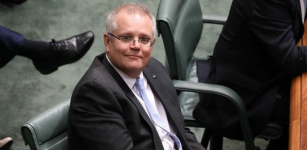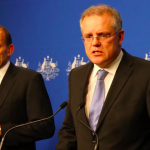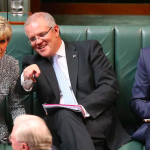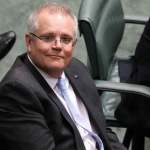Morrison’s Jerusalem Moment: The Damage Done

Australian prime minister Scott Morrison announced on 16 October that his government is considering moving the Australian embassy from Tel Aviv to Jerusalem and recognising the latter as the capital city of Israel.
The beleaguered government’s suggested policy shift was seen as a blatant grab for the Jewish vote in last Saturday’s Wentworth byelection. But, in Morrison’s true bumbling style, it was later pointed out that most of those constituents had already cast a postal vote to avoid voting on the Sabbath.
The PM said the proposal was suggested by the Liberal party’s candidate in the byelection Dave Sharma: a former Australian ambassador to Israel. And it turns out Morrison had even been spruiking the idea over the phone to Israeli PM Benjamin Netanyahu, who tweeted his thanks.
A considered move?
Morrison explained that the possible shift in policy would be in keeping with the two-state solution to the Israeli-Palestinian conflict – Australia’s long-term stance on the situation – despite the fact that he’s overtly throwing his weight behind one party over the other.
The US moved its embassy to Jerusalem last May. Trump’s announcement of this development in December last year led to widespread violent clashes in the Gaza Strip and the West Bank. And a leaked ASIO document revealed our PM had been warned that his announcement could have similar outcomes.
Morrison’s decision to actually throw the idea out there has led many to question whether the new prime minister really understands that when he takes to the microphone to make fickle remarks about volatile situations overseas in order to win small domestic gains it can have disastrous effects.
Choosing sides
“The prime minister’s thought bubble in relation to Australia’s embassy in Israel – it can hardly be called an announcement – is dangerous and damaging on many fronts,” said Bishop George Browning, president of the Australia Palestine Advocacy Network.
“It is the most blatant subjection of complex foreign policy to domestic party political aspiration that Australia has seen in recent memory,” he explained. And he went on to question whether the PM would persist in belittling Australia’s standing as a “considered and reliable” contributor to foreign affairs.
According to Bishop Browning, the ability that Australia has to play a meaningful role in the Middle East peace process is quickly receding as “the trust of those who support the rights of the Palestinian community has been diminished”.
Indeed, as part of his Middle Eastern-related announcement last Tuesday, Morrison said the government was further considering pulling out of the Iran nuclear deal and strengthening defence ties with Israel. He said it would also be voting against the Palestinian Authority becoming G77 chair.
Last Wednesday, the UN General Assembly voted the Palestinian Authority in as the next chair of the G77: a group that promotes the interests of developing nations. One hundred and forty six countries voted in favour of the move, while only three voted against it: Israel, the US and Australia.
Mounting atrocities
“Australia is confirming itself as a partisan player,” Bishop Browning told Sydney Criminal Lawyers®. And it “is knowingly rewarding bad behaviour on behalf of Israel and passively contributing to undeserved suffering on the part of the Palestinian people.”
The Netanyahu government is currently continuing the expansion of Israeli settlements in the West Bank, in violation of international law. A 2016 map shows that due to recent expansion, 60 percent off the region is now off limits to Palestinian development.
Israel continues to arrest and detain between 500 and 700 Palestinian children a year, often for the crime of throwing stones. Around 60 percent of the kids sentenced to prison are then transferred from the occupied territories to facilities inside Israel in violation of the Fourth Geneva Convention.
The Gaza Strip operates like an open air prison today. One of the most densely populated areas in the world, the 2 million people living in the region are cut off from vital supplies due to an Israeli commercial goods blockage that began back in 2005.
On May 14, the day the US embassy opened in Jerusalem to much fanfare, Israeli forces killed 58 unarmed Palestinian demonstrators protesting along the border of the Gaza Strip, calling for the right to return to their homelands within Israel and for an end to the blockade.
Economic ties threatened
Bishop Browning pointed out that Morrison in flagging the Jerusalem idea has also caused “unnecessary tension between Australia and its Arab and Muslim partners, including Indonesia”, which has put trading arrangements at risk.
Following the announcement on Tuesday, representatives from 13 different Middle Eastern and North African embassies met for an emergency meeting in Canberra. They condemned the PM’s suggestion and said that it could lead to a “breakdown in economic relations”.
And ties with Indonesia – the world’s most populous Muslim nation – have also been put in jeopardy due to Morrison’s Jerusalem moment. There have been concerns that the newly established Indonesia-Australia Comprehensive Economic Partnership Agreement could be threatened.
Causing havoc in its dying days
On the domestic front, Bishop Browning stressed that relations between the government and the public service have been damaged. He said the Department of Foreign Affairs and Trade will now assume its role is no longer to offer advice, but to prop up the aspirations of political parties.
And another difficulty that the “Australian government’s partisan political stance” on Israel and Palestine has caused is that it’s hindering the work of “Church NGOs, Oxfam and World Vision”, as their aid is no longer making it to the “most needy and vulnerable”.
The Middle Eastern considerations Morrison set out last Tuesday are now being reviewed by the government. And it will announce the review results in December. However, it’s very unlikely the current government will still be standing by that time.
“This thought bubble from the prime minister together with the foreign minister’s muteness,” Bishop Browning concluded, “leaves the Australian electorate with zero confidence that the government will engage in foreign policy with Australia’s and the world’s best interests in mind.”







